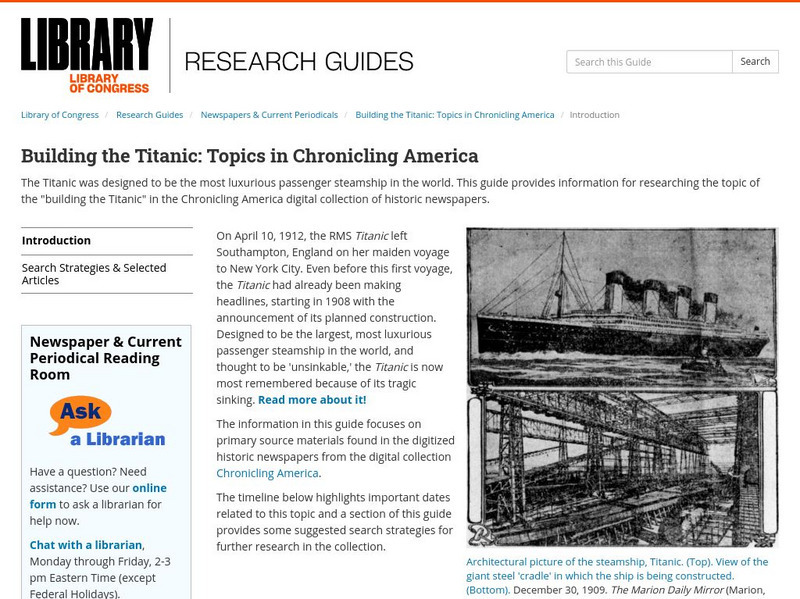Library of Congress
Loc: Henry Clay: A Resource Guide
Library of Congress provides digital collections of Henry Clay's work. Perhaps the most helpful collection is a selection of Clay's speeches: New Army Bill, South American Independence, "In Defense of the American System" and others.
Library of Congress
Loc: The Building of the Titanic
Before the Titanic disaster, what did the world know about the ship? Use these articles from early newspapers, dated 1908 to 1910, to read about the exciting news of the building of the Titanic.
Library of Congress
Loc: Interviews With Today's Immigrants
This site, part of a larger lesson plan about immigration from the Library of Congress, provides interviews that students had with immigrants from around the world.
Library of Congress
Loc: Teachers: America at the Centennial
A lesson plan requiring student to analyze primary documents from the Philadelphia Centennial Exposition of 1876. Learners interpret what these historical artifacts say "about the lives and values of Americans in 1876" among other things.
Library of Congress
Loc: Teachers: The Immigrant Experience: Down the Rabbit Hole
Through a series of six activities, students read about, connect to, and draw conclusions about the immigrant experience, via personal experience and a collection of resources, including Lewis Carroll's "Alice in Wonderland," oral...
Library of Congress
Loc: Nineteenth Century Women: Struggle and Triumph Lesson Plan
Journals, letters, and narratives reveal a part of America's history not revealed in textbooks, the story of women, namely the women of the 1800s. With this lesson, students gain understanding of women and history through various primary...
Library of Congress
Loc: Teachers: The American Dream
With the help of digitized primary documents -- pictures, photograph, recordings, and written accounts -- students will explore and define what the "American Dream" meant for people over the course of the nineteenth and twentieth...
Library of Congress
Loc: Creating a Primary Source Archive: All History Is Local
A lesson plan where young scholars collect local primary documents and examine the interplay between national, state, local, and personal history.
Library of Congress
Loc: Teachers: Photos From Great Depression: Jacob Have I Loved
A collection of images from the period of the Great Depression to World War II provide students with visual references as they read and examine Katherine Paterson's novel, "Jacob Have I Loved." Lesson encourages critical thinking about...
Library of Congress
Loc: The Constitution: Counter Revolution or National Salvation
Using primary texts and prior study of Colonial America and the Revolution, students examine "what type of government would best represent the ideals of the American Revolution." Worksheets, discussions, and role-playing within this...
Library of Congress
Loc: Teachers: Suffragists and Their Tactics Lesson Plan
Students work with two document collections, "Votes for Women: Suffrage Pictures: 1850-1920" and "Votes for Women: 1848-1921", to understand how the suffragists changed the requirements for voting in America.
Library of Congress
Loc: Teachers: Indian Boarding Schools
The Library of Congress provides a series of lessons that taddresses historical efforts of assimilating Native American children into white culture through boarding schools.
Library of Congress
Loc: Teachers: Civil War Photographs: The Mathew Brady Bunch
Students browse a collection of over one thousand Civil War photos, and then choose one to examine in-depth. The resulting assignment is a news article based on the photo's events and subject matter.
Library of Congress
Loc: Teachers: Exploring Community Through Local History
Guidelines for exploring local history and culture through examining a collection of written and spoken stories, landmarks, and traditions, such as food, festivals, and events. Students will research a variety of primary resources and...
Library of Congress
Loc: Teachers: New Deal Programs: Brother, Can You Spare a Dime?
Photographs and life histories aid students in examining the lives of real people during the Great Depression, specifically those impacted by the New Deal programs and agencies. The culminating student products of this lesson will...
Library of Congress
Loc: Teachers: Mark Twain's Hannibal
Primary texts, such as music, photographs, and maps, allow young scholars to examine how Mark Twain's life in Hannibal, Missouri, influenced his popular written works, "The Adventures of Huckleberry Finn" and "The Adventures of Tom Sawyer."
Library of Congress
Loc: After Reconstruction: Problems of African Americans
After reading a collection of primary texts, students will identify problems facing African Americans in the South following Reconstruction and propose solutions to those problems. In addition to providing guidelines for teachers leading...
Library of Congress
Loc: Teachers: Geography and Its Impact on Colonial Life
Beginning with a discussion on how people adapt to or relocate to environments, this lesson encourages students to explore why the Colonists settled in specific regions. In groups, students examine primary documents, analyzing Colonists'...
Library of Congress
Loc: Experiencing War: African Americans: Fighting Two Battles
Online personnel narratives by African American soldiers who participated in World War II.
Library of Congress
Loc: Prints and Photographs: Liljenquist Civil War Photographs
View an entire collection of ambrotype and tintype photographs of Union and Confederate soldiers.
Library of Congress
Loc: New Deal Programs: Federal Art Project
This interesting resource showcases projects produced by a multitude of artists who participated in the Federal Art Project, part of the WPA, a New Deal agency. Find almost 1,000 posters created for many different federal and community...
Library of Congress
Loc: Prints and Photographs Reading Room the Dry Years
Here are selected photographs from the Library of Congress depicting the silly and serious aspects of Prohibition. Find a picture of the largest still in the world and a dog trained to sniff out "spirits."
Library of Congress
Loc: Everyday Mysteries: Why Do Bats Live in Caves?
Ever wonder why bats live in caves? Or why bats don't fly into objects at night? This article describe why bats thrive in the protected shelter a cave provides. It also explains how bats use echolocation to locate food and avoid obstacles.
Library of Congress
Loc: American Memory Timeline: Colonial Settlement,1600s 1763
Read about the colonization in the New World by many European countries. Hyperlinks to you to more specific topics.

























